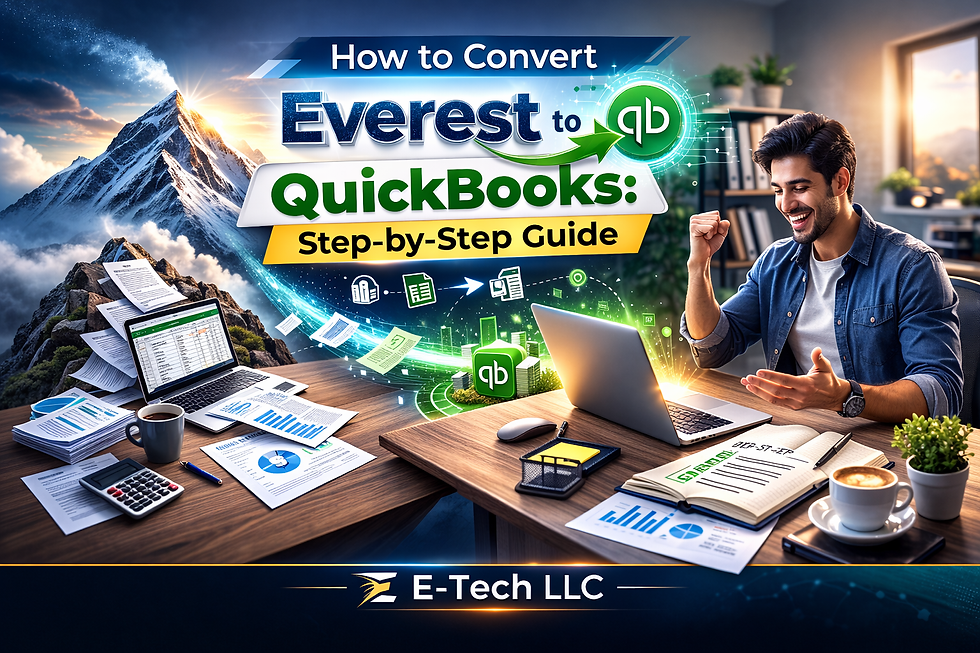BusinessWorks to QuickBooks: A Complete Guide to Converting Your Data
- quickbooksrepair00
- Oct 14, 2024
- 4 min read
Switching accounting software can be a daunting task, especially when moving from one robust platform to another, such as from Sage BusinessWorks to QuickBooks. BusinessWorks users may feel the need to convert to QuickBooks for a variety of reasons, including better integration, more user-friendly features, or cloud capabilities. However, ensuring a smooth transition requires careful planning and a reliable conversion process.
In this blog, we will explore why businesses may choose to convert from BusinessWorks to QuickBooks, the steps involved in the conversion, and the benefits of enlisting a professional service for a seamless migration.
Why Convert from BusinessWorks to QuickBooks?
Sage BusinessWorks has been a powerful accounting solution for many years, particularly for small to medium-sized businesses. However, businesses might find QuickBooks to be a better fit as they grow or their needs evolve. Here are some common reasons for converting:
Ease of Use: QuickBooks offers a more intuitive and user-friendly interface, making it easier for users without extensive accounting backgrounds to manage their financial data.
Cloud Capabilities: QuickBooks Online provides the ability to access your financial data anytime, anywhere, which is a significant advantage for businesses with remote teams or employees who travel frequently.
Advanced Integrations: QuickBooks integrates with a vast ecosystem of third-party applications for CRM, e-commerce, inventory, and more, which enhances business efficiency.
Scalability: As your business grows, QuickBooks provides more flexible solutions such as QuickBooks Enterprise, which is ideal for handling larger volumes of transactions and users.
Cost-Effective: QuickBooks is often a more cost-effective solution for small businesses than maintaining an on-premise installation of BusinessWorks.
Steps to Convert BusinessWorks Data to QuickBooks
The process of converting data from BusinessWorks to QuickBooks involves several key steps to ensure accuracy and minimize downtime. Below is a general outline of what you can expect during the conversion process.
1. Backup Your BusinessWorks Data
Before starting the conversion, it’s essential to back up your BusinessWorks data. This ensures that you have a safe copy of your financial information should anything go wrong during the process. It's also a good practice to perform routine backups, even when you're not migrating.
2. Evaluate Your Data
Take the time to review your BusinessWorks data to ensure it's accurate and up to date. This includes cleaning up old transactions, deactivating unused accounts, and resolving any outstanding errors in your current data. The cleaner the data, the easier the migration will be.
3. Prepare for the Conversion
QuickBooks and BusinessWorks have different data structures, so you can’t simply import BusinessWorks data directly into QuickBooks. You’ll need to assess what data will be transferred and how it aligns with QuickBooks’ structure.
Key data that should be considered for conversion includes:
Chart of Accounts: Mapping your BusinessWorks accounts to the appropriate QuickBooks accounts.
Customer and Vendor Lists: Ensure these lists are accurate and that names match.
Transaction History: Depending on your business needs, you may want to bring over full transaction histories or just starting balances.
Inventory Data: If you manage inventory in BusinessWorks, this can also be converted to QuickBooks, but careful attention to detail is needed to ensure accuracy.
4. Use a Professional Data Conversion Tool
Manual conversion can be risky and time-consuming. Using a reliable data conversion tool or service ensures that your data is transferred accurately and efficiently.
Professional tools convert all of your data, including:
Accounts and balances
Customer and vendor lists
Transactions (invoices, payments, and bills)
Inventory items and quantities
Payroll information (if applicable)
5. Test the Data in QuickBooks
Once the data has been migrated, it’s essential to thoroughly review it in QuickBooks. This includes checking that accounts match, running reports to verify balances, and ensuring that all transactions and historical data have been accurately transferred.
6. Set Up QuickBooks Preferences
After the data migration, take time to set up your QuickBooks preferences. This includes enabling the right features, configuring settings for taxes, and adjusting your reports to meet your specific business needs. QuickBooks allows a high degree of customization to ensure that your financial management process is aligned with your business requirements.
7. Training and Support
Converting to a new accounting system involves a learning curve. Once you’ve moved your data, consider training sessions for your team to familiarize themselves with QuickBooks. Understanding how to manage accounts, generate reports, and enter transactions in QuickBooks will ensure a smooth transition and minimize disruptions to your business operations.
Benefits of Using a Professional BusinessWorks to QuickBooks Conversion Service
While some businesses might attempt a manual conversion, hiring a professional conversion service like E-Tech ensures a hassle-free experience. Here are the key benefits of working with a professional:
Accurate Data Conversion: Professionals ensure that all your data—whether it’s from customer records, vendor lists, transactions, or payroll—gets migrated correctly, with minimal risk of data loss or errors.
Comprehensive Service: A professional service can convert not only basic accounting data but also historical transactions, job costing, and inventory details, which may not be easily transferred through manual methods.
Time-Saving: A data conversion service takes care of the technical details, saving you hours of manual data entry, troubleshooting, and testing.
Minimizes Downtime: Expert services complete the conversion quickly and efficiently, reducing the time your business is offline or without access to its financial data.
Ongoing Support: Many services offer support during and after the conversion, ensuring you can resolve any issues that arise quickly and get your team up to speed with the new software.
Final Thoughts
Migrating from Sage BusinessWorks to QuickBooks can be a game-changer for businesses looking to improve their financial management, integrate modern tools, and enhance productivity. By following a structured conversion process and relying on professional services, you can ensure a smooth and successful transition with minimal disruption to your operations.




Comments